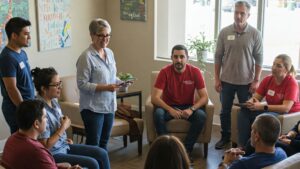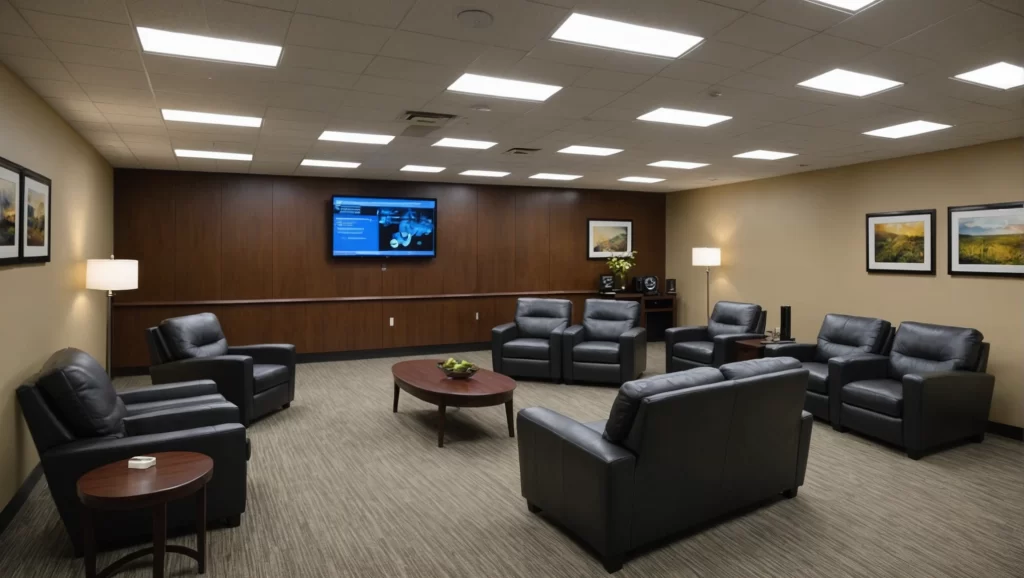Why Aftercare Programs Make All the Difference in Addiction Recovery
Completing an addiction treatment program is a tremendous accomplishment, but it’s only the beginning of the recovery journey. Aftercare programs provide the critical support needed to maintain sobriety and continue personal growth after leaving structured treatment. At Ridgeline Recovery, we’ve seen how participation in quality ongoing recovery support can double or even triple long-term recovery success rates compared to going it alone.
This comprehensive guide will explore everything you need to know about ongoing recovery support in Columbus – what they offer, who benefits most, and how to find the right fit for your recovery needs. Whether you’re completing residential treatment or looking to strengthen your existing sobriety, understanding these vital programs will help you build a sustainable recovery foundation.

What Exactly Are Aftercare Programs?
Ongoing recovery support are structured continuing care services designed to support individuals after completing primary addiction treatment. These programs recognize that recovery is an ongoing process requiring long-term support and skill development. Unlike the intensive focus of initial Addiction Treatment, aftercare programs provide maintenance-level care tailored to individual progress and challenges.
The best ongoing recovery support offer a combination of clinical support, peer connection, and practical life skills development. They serve as a safety net during the vulnerable transition from treatment back to daily life, helping individuals apply recovery principles in real-world situations. Research consistently shows that ongoing recovery supportengagement in significantly improves Addiction Recovery outcomes.
The Core Components of Effective Aftercare Programs
Quality aftercare programs typically include several key elements working together to support sustained sobriety:
Continued Therapy and Counseling
Most aftercare programs include regular individual and group therapy sessions. These may focus on relapse prevention, ongoing skill development, or addressing new challenges as they arise in recovery. Many incorporate approaches like DBT Therapy Columbus Ohio to continue building emotional regulation and distress tolerance skills.
Peer Support Groups
Connection with others in recovery is a cornerstone of aftercare programs. These groups provide accountability, shared experience, and practical advice for navigating sober living. Some programs facilitate connections to local 12-step or alternative peer support meetings.
Recovery Coaching
Many aftercare programs offer recovery coaching services, providing personalized guidance and mentorship. Coaches help participants set goals, overcome obstacles, and stay accountable to their recovery plans.
Educational Workshops
Aftercare programs frequently include workshops on topics like stress management, healthy relationships, financial literacy, and career development – all essential skills for rebuilding a sober life.
Alumni Services
Quality treatment centers like Ridgeline Recovery maintain alumni aftercare programs that allow graduates to stay connected through events, volunteer opportunities, and ongoing support services.
Types of Aftercare Programs Available
Outpatient Ongoing recovery support
These structured programs typically meet several times per week, providing continued therapy and support while allowing participants to live at home and maintain work or school commitments. Many are step-down options from more intensive Addiction Therapy Services.
Sober Living Environments
Residential aftercare programs offer drug-free housing with rules and structure to support early recovery. These are ideal for those needing more time in a supportive environment before fully independent living.
Intensive Outpatient Programs (IOP)
For those needing more support than standard outpatient but less than residential, IOP ongoing recovery support provide several hours of therapy multiple days per week.
12-Step or Alternative Peer Support
Many aftercare programs encourage or facilitate participation in mutual aid groups as an ongoing recovery maintenance strategy.
Telehealth Aftercare
Virtual ongoing recovery support have become increasingly popular, offering flexible access to support through online platforms.

Who Benefits Most From Aftercare Programs?
While anyone in recovery can benefit, certain individuals see particularly significant advantages from ongoing recovery support
Those with chronic relapse histories often find the extended support of aftercare programs helps break the cycle. The additional time to practice skills and build sober habits makes a crucial difference.
Individuals with co-occurring mental health conditions benefit from the continued clinical support ongoing recovery support provide. Ongoing therapy helps manage both addiction and mental health symptoms simultaneously.
People returning to high-risk environments, such as those with substance-using family members or friends, need the extra protection aftercare programs offer. Regular check-ins and support help navigate these challenges.
Young adults in recovery often thrive in ongoing recovery support that provide both structure and peer connection during this transitional life stage.
Professionals rebuilding careers benefit from ongoing recovery support that understand work demands while providing necessary recovery support.
How Aftercare Programs Prevent Relapse
Ongoing recovery support employ multiple strategies to reduce relapse risk:
They help individuals recognize and respond to early warning signs before cravings become overwhelming. Many provide Substance Abuse Handouts and other resources to reinforce this learning.
Aftercare programs maintain accountability through regular check-ins and drug testing when appropriate. Knowing someone will notice a slip helps many stay on track.
They provide immediate support during challenging transitions like job changes, relationship issues, or other stressors that might trigger relapse.
Ongoing recovery support help rebuild a sober social network, replacing using friends with positive influences. This social component is often what makes the difference in long-term success.
They offer continued skill-building, allowing more time to practice and internalize coping strategies learned in initial treatment.
Finding the Right Aftercare Program in Columbus
When searching for ongoing recovery support, consider these important factors:
Look for programs with expertise in your specific needs, whether that’s dual diagnosis care, trauma recovery, or particular substance addictions.
Consider the program’s structure and schedule. The best aftercare programs offer enough support without being unnecessarily restrictive as you rebuild independence.
Verify staff credentials and treatment approaches. Quality ongoing recovery support employ licensed professionals using evidence-based methods.
Assess the program’s flexibility. Life in recovery involves work, family, and other responsibilities – good aftercare programs accommodate this reality.
Check availability of ancillary services like career counseling, family therapy, or Addiction Therapy Near Me referrals for specialized needs.
Making the Most of Your Aftercare Experience
To maximize the benefits of aftercare programs:
Attend consistently, even when things are going well. Prevention is far easier than intervention after a slip occurs.
Participate actively in all components. Those who engage fully in therapy, groups, and other offerings get the best results.
Be honest about challenges. Ongoing recovery support can only help with issues they know about – transparency leads to better support.
Apply what you learn. Practice skills from aftercare programs in daily life to reinforce new behaviors.
Build relationships. The connections made in ongoing recovery support often become lifelong recovery supports.
The Financial Aspect of Aftercare Programs
Many wonder about the cost of ongoing recovery support, but several options exist:
Most health insurance plans cover some form ofongoing recovery support, particularly outpatient services.
Many treatment centers like Ridgeline Recovery offer sliding scale fees based on income for those without insurance coverage.
Some nonprofit organizations provide low-cost or free ongoing recovery support for those who qualify.
When considering cost, remember that investing in aftercare programs is far less expensive than the financial consequences of relapse.

Trivia: The History of Aftercare in Addiction Treatment
The concept of aftercare programs dates back to the early 20th century when “aftercare committees” would support patients discharged from inebriate asylums. Modern ongoing recovery support emerged in the 1970s as research demonstrated the importance of ongoing support following primary treatment. Today’s aftercare programs incorporate decades of research into what best supports long-term recovery.
Frequently Asked Questions
How long should I participate in aftercare programs?
Most experts recommend at least 12 months of ongoing recovery support, with some individuals benefiting from ongoing support for several years. The exact duration depends on individual progress and needs.
Can I switch aftercare programs if my needs change?
Absolutely. Quality ongoing recovery support will help you transition to more or less intensive support as appropriate for your recovery stage.
What if I relapse during aftercare?
Good ongoing recovery support view relapse as an opportunity to reassess and strengthen recovery strategies rather than as failure. They provide support to get back on track.
Do aftercare programs work for all types of addiction?
Yes, ongoing recovery support benefit recovery from all substance use disorders and process addictions. Specific approaches may vary based on the addiction type.
Taking the Next Step in Your Recovery Journey
If you’re ready to explore how ongoing recovery support can support your long-term sobriety, contact Ridgeline Recovery today. Our team can help you find the right aftercare program to meet your needs and continue building on your treatment progress. Remember – recovery is a journey, not a destination, and aftercare programs provide the map and supplies you need for the road ahead. Your lasting recovery starts with maintaining the gains you’ve worked so hard to achieve.



